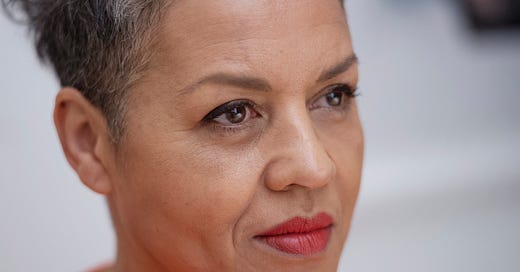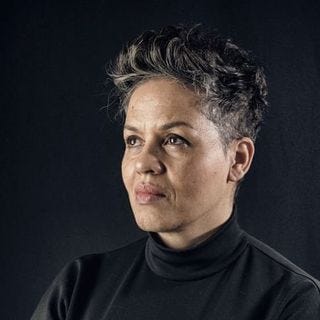Kit de Waal: “Now, I go everywhere as this whole me – not bits of me.”
The author on not policing terminology, being Black and Irish and not giving a fuck
Image: Sarah M. Lee
Hi, welcome back to Mixed Messages! This week I’m speaking to author Kit de Waal, who is of Caribbean and Irish heritage. Kit grew up in Birmingham and has used her experiences to inform her works, including My Name Is Leon (which was adapted for TV earlier this year). I’m a huge fan of Kit’s writing, especially with her Brummie heritage, so I was thrilled to find out how she feels about her mixedness in this conversation. Read it below.
How do you define your racial identity?
Growing up, we were called half-caste, and that’s how we would have spoken about ourselves. We were also called coloured. I was also referred to as an Irish woman. I’m referred to as a Black woman. I’m referred to as ‘dual-heritage’ or ‘biracial,’ I don’t like those terms.
‘Mixed-race’ is the easiest expression, but I don’t feel it’s completely accurate. It’s so general it’s a joke. If someone asks what I am, I rarely say mixed-race. I usually say Irish and Caribbean. It’s specific.
Has that been consistent over time?
That’s changed in the past twenty years. If people use the phrase half-caste for themselves, I think ‘fine, that’s your business.’ You have Black people calling themselves the N-word everyday. They have decided to adopt, celebrate and embrace that word. So if you want to say half-caste, fine. But I think you should know where it comes from, what it means and why some people would find it offensive.
I’m really not into policing anyone else’s terminology of how they want to self-describe. It’s really up to them, and wherever possible, I would try and accommodate that. But my preference is to be specific, so if you’re Welsh and Indian, say Welsh and Indian.
You’ve also had the experience of being Irish and people not accepting Irish communities.
I’m two minorities. At one point, it would have been better for me to be Black than it was Irish, certainly when the bombings were going on in Birmingham. I think that’s made me who I am. I’m not fazed by that, I’m very proud to be both.
Growing up, I was more likely to be accepted in the West Indian community. In the Irish community I stood out like a sore thumb.
Aside from cultural events, how else have you connected to your heritages?
Music is a big one. My grandfather was a musician, playing Irish folk and rebel songs on the accordion and fiddle. These songs were beautiful and got right under your skin. Then we’d listen to a lot of African Caribbean music at home. That spoke to you in a very different way.
Food, language… We almost had different vocabularies for each community. If I asked my Irish grandmother if something was hot, she’s talking temperature. If I ask anyone in the West Indian community… in fact I remember changing it and said ‘is it pepper’ because I knew, imperceptibly, the vocabulary had to be tailored to the community that you’re in. You become this other person, the inside of you that is African Caribbean comes to the front and you say ‘these are my people’. The same when you’re with the Irish community. They’re both completely authentic and whole, you feel completely that thing when you’re with them. When you’re not, that thing doesn’t die or disappear, but sometimes they get to shine.
Do you still feel that way today?
I do. I’m far more integrated as a person now, I go everywhere as this whole me, not bits of me. Sometimes with age, you lose all that hand-wringing. You see that the wish to define and compartmentalise is other people’s problem. If somebody looks at me and goes ‘you’re not Irish,’ that’s cool. You get this force field around you, you don’t need to talk about it or explain it. You don’t need to define it. You don’t need to contort yourself into this shape.
I do not give a fuck about being liked. I’m me, and I’m really good with it. I’m always trying to make that me better, me is not perfect, but me is good for me now and what I’ve been through and what I think of the world. One of the few benefits of getting older is embracing the grey zone, where there’s no answers.
Do you think the conversation about mixedness is stuck in any way? Would you like to see us leaning into those grey areas?
It is leaning into the grey areas, but I do think there’s a long way to go. Until recently in America, it might still be going on, you’re defined by the percentage of Blackness in us. The more white, the more valuable or attractive. In this country, you still have an ideal presentation of Black that’s basically Meghan Markle, who has mostly European features, the lightest skin and the straightest hair. That’s the mixed-race ideal beauty. She’s acceptable because we are dominated by Eurocentric ideals of Blackness.
Until that is no longer a thing, but I can’t ever imagine that not happening, we need to continue to talk about race. My people are persecuted around the world. I’m in that fight and in that conversation. It’s impossible to continue in a racist society and not feel involved with it as a Black woman. Then there’s me as an Irish woman, having all sorts of debates about refugees, asylum seekers, non-obvious looking Irish people in Ireland.
What we shouldn’t do is get so hung up on terminology. We must never fall into the massive danger zone of thinking that we are somehow separate from the struggle for Black equality. We’re not separate from it. We are part of that argument, and I don’t think we should hive ourselves off from it or feel in any way better, or take a step out of that lane. You should stay in that lane of fighting for Black equality.
If there’s a revolution and we say ‘let’s kill all Black people,’ no-one’s going to look at me and go ‘not her ‘cos her mom’s white.’ I’m dead. So it’s our struggle. It’s part of my heritage.
Clearly mixedness has a tangible impact on your work and storylines, like in My Name Is Leon. Have there been any ways mixedness has impacted you in intangible ways? Maybe an interest in language and adapting for different settings and characters?
In 1960’s Birmingham, I stood out as a mixed-race person. There were four or five families, and us children became a tribe because we were the only people that had our life experience. They were the only people that understood who I truly am. It made me a watcher, slightly outside of many situations. Being a watcher is what you need to be as a writer, so I think it’s made me quite introverted.
What’s one of the best things about being mixed for you?
I don’t see any negatives. For me, it’s perhaps a broader, more intimate understanding of other arguments. As a mixed-race person, you can go ‘I don't agree with you, but I get you.’ You have a different understanding.
There's so many positives about being mixed-race. I think the future is not getting hung up on looking like we belong in a country. If you’re Black and from Iceland, that should be fine. It’s both something to be celebrated and something to be ignored. Something to be taken in your stride. We're a long way from that.
Can you sum up your mixed experience in a word?
Diamond. Diamonds have lots of facets – they all shine, but you can show one a little bit more than another one.
Kit de Waal’s memoir, Without Warning and Only Sometimes, is out now. Watch out for Mixed Messages’ second anniversary giveaway (launching soon) where you can win a copy of the book! Next week I’ll be talking to presenter Miquita Oliver. Subscribe to get Mixed Messages in your inbox on Monday.
Enjoy Mixed Messages? Support me on Ko-Fi! Your donations, which can start from £3, help me pay for the transcription software needed to keep this newsletter weekly, as well as special treats for subscribers.
Mixed Messages is a weekly exploration of the mixed-race experience, from me, Isabella Silvers. My mom is Punjabi (by way of East Africa) and my dad is white British, but finding my place between these two cultures hasn’t always been easy. That’s why I started Mixed Messages, where each week I’ll speak to a prominent mixed voice to delve into what it really feels like to be mixed.








